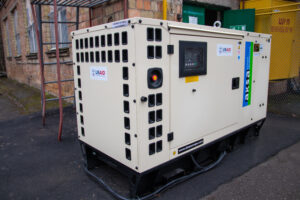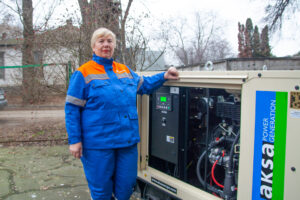The United States Agency for International Development (USAID), through the Energy Security Project, transferred 137 generators worth about UAH 40 mln to the Communal Utility Kyivteploenergo (CU KTE).

The USAID Energy Security Project (ESP) was one of the first to start a systemic supply of generators for Kyiv, whose critical infrastructure facilities were attacked by russian missiles. To support the operation of the thermal energy facilities in Kyiv, U.S. Government provided the CU Kyivteploenergo with generators between 7 to 100 kW capacity.
Thirty-eight of the provided generators ensured an uninterrupted operation of heat-generating equipment in 38 boiler houses in Kyiv, which is about 25% of all heat sources under KTE control. The generators provided by USAID through the ESP make it possible to supply heat and hot water to over 160 residential buildings, 30 hospitals, 25 schools, and over 220 departmental buildings. Another 15 generators ensured the backup power supply to CU Kyivteploenergo’s operations and dispatching facilities, enabling steady communication between the utility’s units. The remaining 84 generators supported the needs of the repair teams allowing them to daily repair damaged heat networks in all city districts during the heating season.
This aid, provided by USAID through the ESP, allowed CU Kyivteploenergo to keep producing heat and reduce the interruptions of heat and hot water supply to residents of Kyiv and municipal critical infrastructure facilities during the 2022/2023 heating season.
“Despite the missile terror, we managed to keep the Kyiv heat facilities operational and continue heat supply to Kyivans. We are extremely grateful to the U.S. Government and USAID for their support during such challenging times. We installed the generators provided by USAID in priority order at boiler houses, which supply heat to hospitals, critical social infrastructure, and residential buildings. Thanks to alternative energy sources, the CU KTE enabled them to continue receiving heat in autonomous mode. We keep the generators in boiler houses to increase the stability of heat supply to our clients and to promptly respond to security challenges,” noted Vasyl Derevytskyi, Director of the Structural Division “Kyivski Teplovi Merezhi” (Kyiv Heat Networks), CU Kyivteploenergo.
The CU Kyivteploenergo’s staff quickly mastered the algorithms of switching the boiler houses to generators. Those processes, earlier practiced during training sessions on generator usage, became a part of their routine work.

USAID’s generators made it possible to provide heat to Kyiv’s critical infrastructure, including the children’s hospital and a boarding house.
“We have been worrying about how we can get through this winter. We have one of the biggest children’s hospitals and many other important units, including a section for newborns. The temperature here should always be stable. From the beginning of missile attacks on Kyiv, the boiler house equipment was frequently turned off due to a lack of electricity. The heat supplies got interrupted from time to time. We felt more confident with the USAID generator installed in the hospital’s boiler house. Even if the heating is disconnected, our small patients will stay warm,” says Tetiana Antonova, Deputy Director of Technical Issues of Kyiv City Children’s Hospital No. 1.
“The USAID-provided generator for the boiler house, which serves our pre-school facility, was a timely and vital assistance. We have 75 children with special needs. They need to stay in a comfortable environment. We switched the generator twice daily – in the morning and evening. Despite continuous power cuts, we had heating and hot water throughout the winter. The children and staff stayed warm,” noted Olena Hrabovska, Director of Darnytsia Children’s Boarding House in Kyiv.
